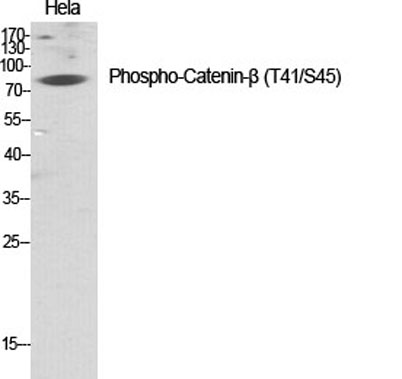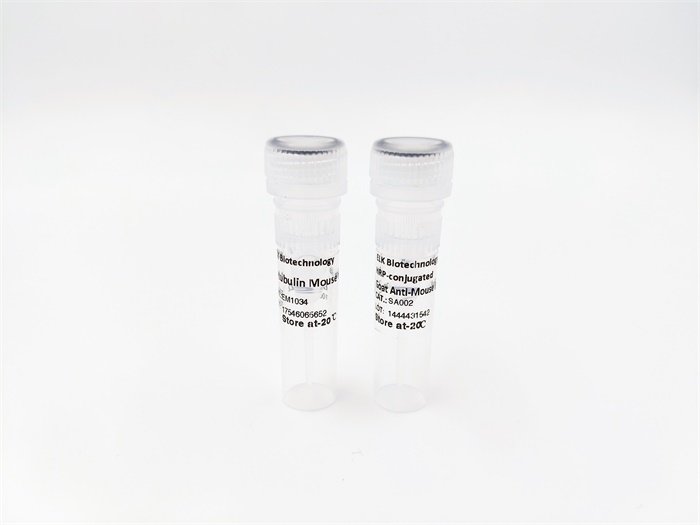| Product name: |
Catenin-β (phospho Thr41/S45) rabbit pAb |
| Reactivity: |
Human;Mouse;Rat |
| Alternative Names: |
CTNNB1; CTNNB; OK/SW-cl.35; Catenin beta-1; Beta-catenin |
| Source: |
Rabbit |
| Dilutions: |
Western Blot: 1/500 - 1/2000. ELISA: 1/20000. Not yet tested in other applications. |
| Immunogen: |
The antiserum was produced against synthesized peptide derived from human Catenin-beta around the phosphorylation site of Thr41/Ser45. AA range:11-60 |
| Storage: |
-20°C/1 year |
| Clonality: |
Polyclonal |
| Isotype: |
IgG |
| Concentration: |
1 mg/ml |
| Observed Band: |
92kD |
| GeneID: |
1499 |
| Human Swiss-Prot No: |
P35222 |
| Cellular localization: |
Cytoplasm . Nucleus . Cytoplasm, cytoskeleton . Cell junction, adherens junction . Cell junction . Cell membrane . Cytoplasm, cytoskeleton, microtubule organizing center, centrosome. Cytoplasm, cytoskeleton, spindle pole. Cell junction, synapse . Cytoplasm, cytoskeleton, cilium basal body . Colocalized with RAPGEF2 and TJP1 at cell-cell contacts (By similarity). Cytoplasmic when it is unstabilized (high level of phosphorylation) or bound to CDH1. Translocates to the nucleus when it is stabilized (low level of phosphorylation). Interaction with GLIS2 and MUC1 promotes nuclear translocation. Interaction with EMD inhibits nuclear localization. The majority of beta-catenin is localized to the cell membrane. In interphase, colocalizes with CROCC between CEP250 puncta at the proximal end of cent |
| Background: |
The protein encoded by this gene is part of a complex of proteins that constitute adherens junctions (AJs). AJs are necessary for the creation and maintenance of epithelial cell layers by regulating cell growth and adhesion between cells. The encoded protein also anchors the actin cytoskeleton and may be responsible for transmitting the contact inhibition signal that causes cells to stop dividing once the epithelial sheet is complete. Finally, this protein binds to the product of the APC gene, which is mutated in adenomatous polyposis of the colon. Mutations in this gene are a cause of colorectal cancer (CRC), pilomatrixoma (PTR), medulloblastoma (MDB), and ovarian cancer. Alternative splicing results in multiple transcript variants. [provided by RefSeq, Aug 2016], |




 Western Blot analysis of various cells using Phospho-Catenin-β (T41/S45) Polyclonal Antibody diluted at 1:1000
Western Blot analysis of various cells using Phospho-Catenin-β (T41/S45) Polyclonal Antibody diluted at 1:1000 Western Blot analysis of HepG2 cells using Phospho-Catenin-β (T41/S45) Polyclonal Antibody diluted at 1:1000
Western Blot analysis of HepG2 cells using Phospho-Catenin-β (T41/S45) Polyclonal Antibody diluted at 1:1000 Western blot analysis of lysates from HepG2 cells, using Catenin-beta (Phospho-Thr41/Ser45) Antibody. The lane on the right is blocked with the phospho peptide.
Western blot analysis of lysates from HepG2 cells, using Catenin-beta (Phospho-Thr41/Ser45) Antibody. The lane on the right is blocked with the phospho peptide.在線咨詢
技術(shù)支持



 下載說明 ①
下載說明 ①



